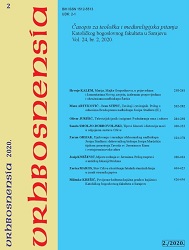TIPOVI LIČNOSTI I DISTORZIJA MOĆI U ODGOJNOM SUSTAVU CRKVE
PERSONALITY TYPES AND POWER DISTORTION IN THE CHURCH’S EDUCATIONAL SYSTEM
Author(s): Sanda Smoljo-DobrovoljskiContributor(s): Darko Tomašević (Translator), Kevin Sullivan (Translator)
Subject(s): Christian Theology and Religion, Education, Personality Psychology
Published by: Katolički bogoslovni fakultet
Keywords: power; service; personality; personality disorders; narcissism;
Summary/Abstract: This article deals with analysis of personality types in the Church’s formation system, which, given their psychological structure, maturity or pathology, may use evangelical power as a service or in a distorted form – exploiting others for their own gratifications or self-interest. The aim is, by analyzing healthy and pathological personality dynamics – narcissistic, histrionic and borderline – to identify blind spots in the formation process in order to diagnose in a timely manner and treat people who have serious difficulties, as a result of which they may cause psychological or spiritual pain to others. Special emphasis is placed on the analysis of the widespread culture of narcissism, which is growing exponentially in both secular and ecclesial contexts. The paper is divided into three thematic units which are developed in several sub-units. The first part points to the need for pedagogical renewal and analyzes the factors that may cause the formation or deformation of the personality. The second part deals with the theological-biblical concept of service and power in the New Testament with a psychological interpretation of the desire for power. The third part deals with healthy and pathological personality typologies that are present in the formation system, and points to gaps in formation that may result in pathological and/or immature dynamics.
Journal: Vrhbosnensia
- Issue Year: 2020
- Issue No: 2
- Page Range: 300-322
- Page Count: 23
- Language: Bosnian

